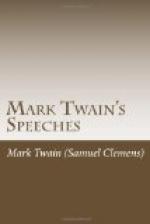We have, however, one Fourth of July which is absolutely our own, and that is that great proclamation issued forty years ago by that great American to whom Sir Mortimer Durand paid that just and beautiful tribute—Abraham Lincoln. Lincoln’s proclamation, which not only set the black slaves free, but set the white man free also. The owner was set free from the burden and offence, that sad condition of things where he was in so many instances a master and owner of slaves when he did not want to be. That proclamation set them all free. But even in this matter England suggested it, for England had set her slaves free thirty years before, and we followed her example. We always followed her example, whether it was good or bad.
And it was an English judge that issued that other great proclamation, and established that great principle that, when a slave, let him belong to whom he may, and let him come whence he may, sets his foot upon English soil, his fetters by that act fall away and he is a free man before the world. We followed the example of 1833, and we freed our slaves as I have said.
It is true, then, that all our Fourths of July, and we have five of them, England gave to us, except that one that I have mentioned—the Emancipation Proclamation, and, lest we forget, let us all remember that we owe these things to England. Let us be able to say to Old England, this great-hearted, venerable old mother of the race, you gave us our Fourths of July that we love and that we honor and revere, you gave us the Declaration of Independence, which is the Charter of our rights, you, the venerable Mother of Liberties, the Protector of Anglo-Saxon Freedom —you gave us these things, and we do most honestly thank you for them.
AMERICANS AND THE ENGLISH
Address at A gathering of Americans in London, July 4, 1872




